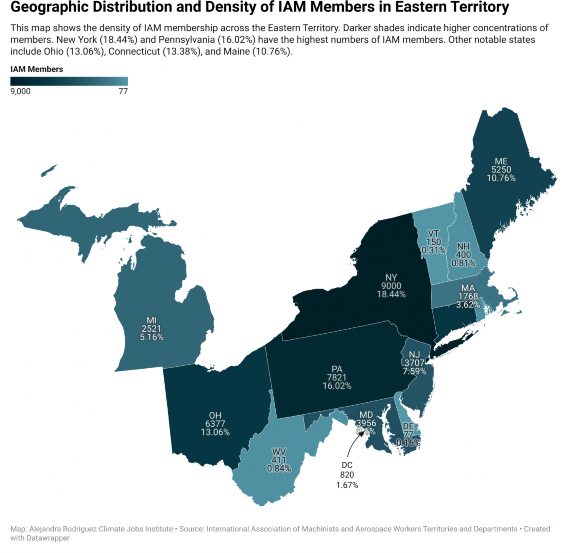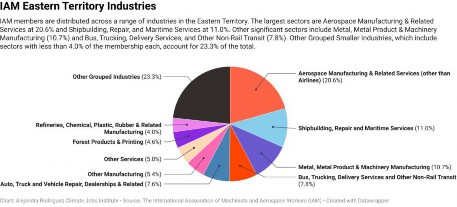< Previous | Contents | Next >
The IAM Eastern Territory, with nearly 50,000 members, includes some of the IAM’s most
union-dense states.109 The territory includes arguably the most union-friendly state in New York,
![]()
the nation’s capital in Washington, DC, manufacturing hotbeds and politically-important states like Michigan, Ohio, and Pennsylvania, and West Virginia–perhaps the state most associated with fossil fuel extraction.

The leading industry in the Eastern Territory is Aerospace Manufacturing & Related Services, representing 20.6% of IAM members in the area.110 Shipbuilding, Repair and Maritime Services follows at 11%, reflecting significant contributions from maritime industries, especially in coastal states.
![]()
110 International Association of Machinists and Aerospace Workers.

Climate Change Impacts on the IAM Eastern Territory
The Eastern Territory of the IAM covers 14 states plus Washington, DC, with a wide variety of climate risks.111 These climate change impacts have significant implications for IAM members and industries across the territory.
In the Northeast region, aerospace workers in Connecticut and shipbuilders in Maine face challenges related to extreme weather events and rising temperatures.112 Massachusetts and New Jersey are experiencing rising sea levels that threaten coastal areas with flooding and erosion.113 Rhode Island faces significant risks from rising sea levels, with projections up to 4 feet by 2100.114
Inland communities are at risk, too. Pennsylvanians who live near gas extraction and industrial agriculture sites are experiencing greater air pollution.115 Changing weather on the Great Lakes affects critical shipping and port operations in places like Michigan and Ohio.116 Anywhere you go, there are serious climate risks to IAM members and their families.
Industry-Specific Climate Impacts and Implications for IAM Workers in the Eastern Territory
The “Industry-Specific Climate Impacts for IAM Workers in the Eastern Territory” table below outlines key industries within the area, detailing their presence in specific states and the potential climate change impacts. This region faces significant environmental changes, which are likely to affect operations, infrastructure, and worker safety across sectors like aerospace manufacturing, transportation, and metal products.
![]()
111 International Association of Machinists and Aerospace Workers.
112 Dupigny-Giroux et al., “Chapter 18: Northeast.”
113 Kunkel et al., “State Climate Summaries for the United States 2022.”
114 Kunkel et al.